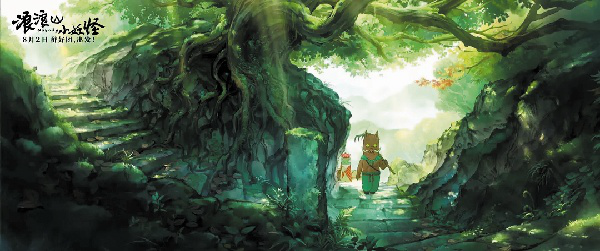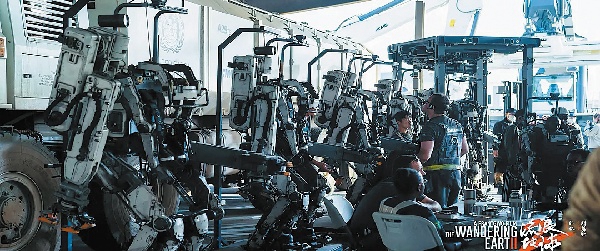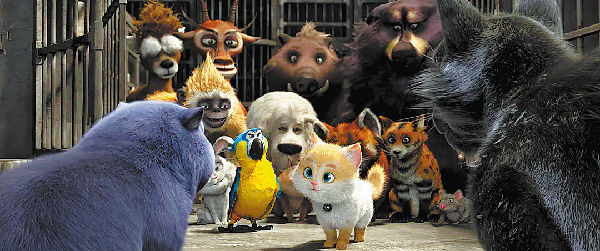A new script for Chinese cinema

A scene from Nobody, a summer blockbuster loosely inspired by the 16th-century novel Journey to the West.[Photo provided to China Daily]
In 1993, Wang Jun, then a college student, volunteered at the first Shanghai International Film Festival. Since then, her career has been intertwined with the Chinese film industry, witnessing its remarkable expansion over the past three decades.
Now chairwoman of the Shanghai Film Group, Wang recently joined four other industry figures — including Shen Ao, director of this summer's highest-grossing blockbuster Dead to Rights — to share their perspectives on the opportunities and challenges facing Chinese cinema at a news conference hosted by the State Council Information Office on Aug 7.
As 2025 marks the 120th anniversary of the birth of Chinese cinema, Wang says that the century-old art form has retained its allure despite sweeping changes in technology and the entertainment market.
She said the 76-year-old Shanghai Film Group is embracing emerging technologies, from establishing an artificial intelligence creation center to using virtual reality to enhance the moviegoing experience. She also reveals that Nobody, a popular animated film inspired by the 16th-century novel Journey to the West, is planning a VR adaptation.
The rise of micro-short dramas is also reshaping the landscape. According to the China Netcasting Services Association, the market for these bite-sized productions reached 50.44 billion yuan ($7.02 billion) in 2024 — up 34.9 percent year-on-year, surpassing the country's annual box-office revenue for the first time.

Sci-fi blockbuster The Wandering Earth 2 showcases the Chinese film industry's improvement in the visual effects sector.[Photo provided to China Daily]
Since smartphones are the primary devices for watching micro-short dramas, most are filmed vertically, sparing audiences from rotating their screens. Reflecting this shift — where more young audiences prefer watching online dramas over spending two hours in a theater — Hengdian World Studios, the country's largest filming base, hosted 1,641 crews that produced vertical-format dramas in the first half of this year, more than seven times the 215 crews that worked on traditional landscape-oriented dramas.
When asked about the competition from short videos and micro-short dramas, director Shen responded, "The film industry has thrived for over a century. Throughout this 100-year journey, cinema has faced multiple waves of challenges, yet it has always retained its unique technical and narrative advantages."

The Light Chaser Animation Studios' animated feature film, Cats and Peachtopia, which follows a cat's adventure, was released in 90 countries and regions.[Photo provided to China Daily]
While short-form content has its strengths, such as being easily accessible, Shen believes the immersive experience of the big screen, complete with spectacular visuals and shared viewing, cannot be replaced.
"Watching a movie has an irreplaceable social aspect. Audiences can discuss the plot and characters with friends or family," adds Shen, one of the country's fastest-rising young directors. His blockbuster No More Bets, about overseas internet fraud, grossed 3.85 billion yuan in 2023 and sparked heated online debates.

Director Shen Ao's Dead to Rights features actor Liu Haoran as an unsung hero who exposes the Japanese invaders' atrocities during the Nanjing Massacre.[Photo Provided to China Daily]
Wei Ming, cofounder and visual effects director of MORE VFX Wuxi Digital Image Technology Co, agreed that cinema delivers a peerless visual spectacle.
He cites The Wandering Earth, China's highest-grossing sci-fi franchise, as an example. The first film, released in 2019, utilized 5,000 lights to realistically illuminate a massive planetary engine — a fictional structure designed to propel Earth out of its orbit and into a cosmic escape journey. For the 2023 sequel, that number rose to tens of thousands, further amplifying the scale and realism.
From Zhang Yimou's 2002 martial arts epic Hero to this year's phenomenal hit Ne Zha 2, Chinese films have steadily expanded their global reach in the past two decades.
"China's film market is vast, but our generation of filmmakers has a mission — to bring Chinese stories to the world," Shen says. "That means showing the cultural essence and spirit of China, not just stacking Chinese elements."

(From left) Industry figures at the news conference: Wei Ming, visual effects director of MORE VFX Wuxi Digital Image Technology Co; Song Yiyi, producer and animator at Light Chaser Animation Studios; director Shen Ao; Wang Jun, chairwoman of the Shanghai Film Group; and Chen Kaifang, chairman of Guiyang Cross Border Cinema.[Photo Provided to China Daily]
Song Yiyi, producer and animator at Light Chaser Animation Studios, highlights the importance of subtitles and dubbing in distributing films overseas. The studio's third feature-length animated film, Cats and Peachtopia, which follows a little cat's adventure, was dubbed in English, Russian, French, Polish and Spanish, and released in 90 countries and regions, grossing $13 million at the overseas box offices. Green Snake, the company's sixth film, was streamed on Netflix in 10 languages in 2021 and became the platform's third most-watched film in its debut week.
Meanwhile, the synergy between cinema and tourism continues to grow. Chen Kaifang, chairman of Guiyang Cross Border Cinema, one of China's highest-grossing theaters, has turned his venue into a cultural destination. A recent 3,000-square-meter expansion introduced a food court showcasing local intangible heritage cuisine and an immersive extended-reality hall.
Reflecting on the industry's growth, Chen says, "Over the past decade, I've seen Chinese cinema grow from a sluggish period to one of renewed confidence. I feel fortunate to pursue a career I'm passionate about, and I firmly believe the future of Chinese cinema will be even brighter."